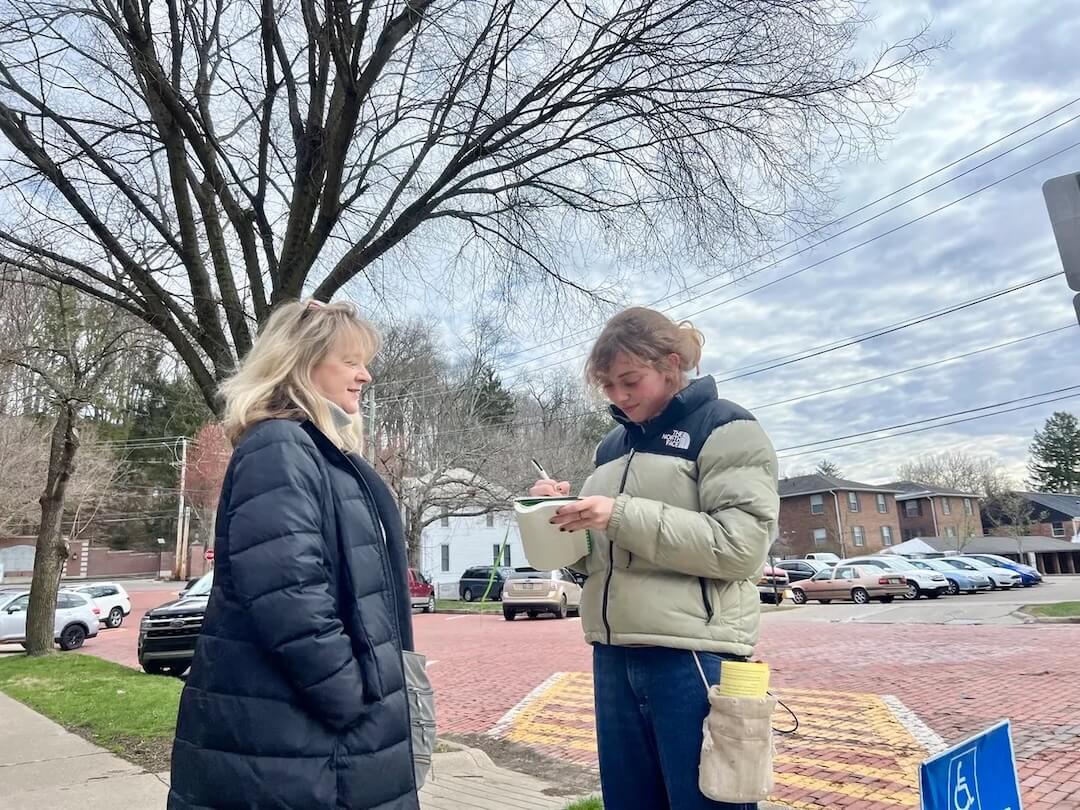This time of year, Greg Bluestein’s job as a political reporter for The Atlanta Journal-Constitution is one of constant contact.
“I’m talking to folks all the time. I have easily 20, 30 conversations a day with different sources and voters and operatives and campaign staffers and candidates themselves,” he said. “And I go to events and talk to a ton of people.”
By the time we spoke with him shortly after 3 p.m. last Thursday, the veteran journalist had already been to a few events with Georgia Gov. Brian Kemp, and before that had trailed behind Stacey Abrams, the Democratic nominee for governor in Georgia. For the AJC, Bluestein covers Kemp’s office and politics in what he describes as one of the premier battleground states in the nation.
“We weren’t that way 10 years ago,” he said.
With the midterm elections less than 50 days away, races in swing states have come under the national spotlight. Making matters more complicated has been the rise of election denialism as candidates and public officials at all levels promote the false narrative that the 2020 election was “stolen.” And on the ground are journalists tasked with sorting through it all to report the truth and provide clarity and crucial context.
Ronald J. Hansen, The Arizona Republic’s national political reporter, said politics in the state has been “rough and tumble” for a while, but the intensity grew after the 2020 election.
“The combination of the extremely close 2020 result here in Arizona, along with the conspiracies like QAnon and other kinds of forces — that mixture really created something that felt a little more combustible, more unpredictable for us here,” Hansen said.
Over the course of his career, Bluestein has seen Georgia politics transform into a national story. He was on the ground two years ago when much of the country zeroed in on the state in the days after the presidential election, and then covered the leadup to the two Senate runoffs that sent Democrats Jon Ossoff and Raphael Warnock to Congress. Warnock is now back in the news as he faces off against Herschel Walker, a candidate who Bluestein noted has a very good chance of winning in November, but who also has a history of lying.
Asked about his approach to combating misinformation, Bluestein said he doesn’t want to repeat falsehoods.
“I want to call things lies when they’re lies,” he said.
There are many venues now through which to combat falsehoods — it’s not just print anymore, he said. There’s online, podcasts and newsletters.
“A lot of reporters these days have regular gigs on radio or TV, so there’s other ways that we can go tell folks what’s really happening, what the truth is, rather than just trying to squeeze it into a print newspaper,” he said.
Newsletters have become even more important for this election season, Bluestein said. In addition to The Jolt, the AJC also recently launched Swing State Georgia. The journalist said he’s had to sharpen his time management and also develop podcast skills.
“I hear almost as much from folks around the community about our podcast, which is called Politically Georgia, than I do about stories I write,” he said, adding that he’s hearing a lot from Georgians on new ways to access the news.
In the face of election misinformation, Hansen said he has fallen back to the basics of reporting. He tries to be as fair as possible while documenting the facts. That means maintaining a “factual framework” to assess public officials’ statements on election integrity.
“In races like (Reps. Paul Gosar’s and Andy Biggs’), where it is a big part of their current political identity, we have made it clear to our readers repeatedly that the claims of a stolen election were false and that they were involved in matters that have been under review by the January 6 committee,” Hansen said.
There’s still a tremendous amount of attention on Georgia, though Bluestein doesn’t think his newspaper’s audience response can be compared to that of 2020.
“I hear from readers and listeners and viewers all the time who can’t get enough coverage. We amped up our coverage considerably at the AJC with podcasts, and we have two newsletters now involving politics in Georgia alone,” he said. “We’ve expanded our political team, and we’re continuing to cover this stuff nonstop.”
This piece originally appeared in Local Edition, our newsletter devoted to the telling stories of local journalists







